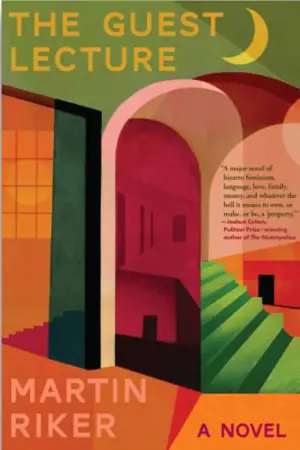The Guest Lecture
by Martin Riker
reviewed by Greg Chase
An original premise drives The Guest Lecture (Grove Press, 2023), Martin Riker’s second novel: Abby, an economist who has recently been denied tenure, lies awake in a hotel room, trying not to disrupt her husband and daughter as they sleep beside her and rehearsing the lecture on John Maynard Keynes she is scheduled to deliver the next day. The novel consists of her interior monologue as she plans out the lecture using the “loci method”: visualizing different rooms in her house and associating each one with a different portion of her speech. In its stream-of-consciousness rendering of a woman’s nighttime thoughts, The Guest Lecture recalls the Penelope chapter of James Joyce’s Ulysses (a novel to which Riker alludes on multiple occasions), even as Abby’s status as an embittered academic marks a crucial difference between her and Molly Bloom.
One of the most successful elements of The Guest Lecture is its incisive commentary on academia from the perspective of a formerly optimistic and ambitious acolyte who has been left thoroughly disillusioned. Abby is furious with her colleagues for voting against her application for tenure, describing them as “old men … poisoning the air with the rarified mouth-stench unique to … the smugly entrenched academic.” She reflects:
Being on the tenure track was like having Obama for president. There were global terrors and political unrest and social injustice, the world was its usual mess, and worse underneath than anyone realized—but it still felt like we were working toward something. … Whereas being denied tenure was Trump. … The world of security and possibility falls away and we’re plunged into a new Dark Ages where nothing is stable, nothing is good.
She imagines putting her colleagues on trial in an elaborate courtroom scene, in which she self-righteously makes the case that she has more than met the requirements for tenure, having published a book on economics and optimism, based on a “heartfelt” personal essay she wrote that went “‘viral,’ in the way online articles occasionally do for no apparent reason.”
But the tone of this triumphant scene soon shifts, as Abby begins flagellating herself for “embarking on an unsanctioned book project,” having known full well that, in so doing, she was “taking obvious risks with both [her] publication record and [her] time.” Abby feels, and resists feeling, that her failure to be granted tenure in a “publish-or-perish” world is her own fault.
At this point in the narrative, Abby, who struggles to remain focused on rehearsing her lecture, begins examining earlier moments in her life, attempting to make sense of how she has reached a place where, as she puts it, her “career … would reject me without any regard for how condescendingly I had agreed to it.” She laments that her course through life should be reduced to a series of coincidences: a college friendship that caused her to gravitate toward all things “experimental,” prompting her to sign up for a course called “Experimental Economics,” the professor of which would become her academic mentor and, years later, prove instrumental in helping Abby to secure her current position. As Abby delves into her own past, recalling people and moments long forgotten, The Guest Lecture becomes a meditation on how a self is constructed.
The premise of the novel allows Riker to demonstrate the links between Abby’s academic interests and her character: her values, her deepest-seated anxieties, her formative relationships. At the same time, in extending this conceit—a character lies awake, thinking—across an entire novel, Riker, perhaps inevitably, pushes against its limits. It’s not clear that anything finally happens in this novel, that Abby comes to any new insights or achieves any kind of lasting perspectival shift. Of course, she may believe that she has, but isn’t it simply in the nature of nighttime rumination to arrive at seemingly life-altering realizations that, viewed in the hard light of day, look distinctly underwhelming, if they’re remembered at all? Abby’s monologue recalls the final chapter of Ulysses, but the power of Molly Bloom’s narrative is that it allows readers to see Leopold from her perspective, after spending so much of the novel viewing Molly through his.
In contrast, the only real guest in The Guest Lecture is Keynes himself, whom Abby imagines touring her house, and who does possess a personality distinct from hers, but who nonetheless remains a projection of her psyche. In other words, what makes Riker’s novel an engaging, insightful read also turns out to be its greatest shortcoming: we can never get outside of Abby’s own head.
Published on August 17, 2023

